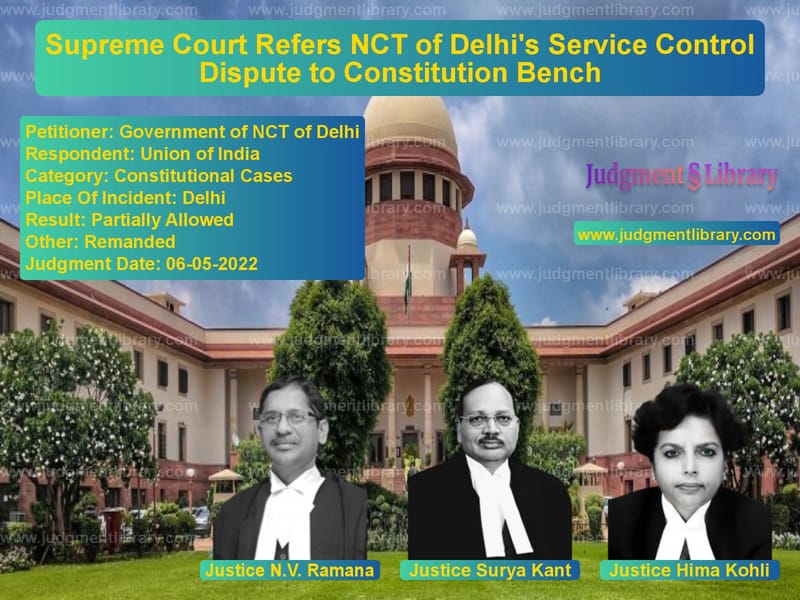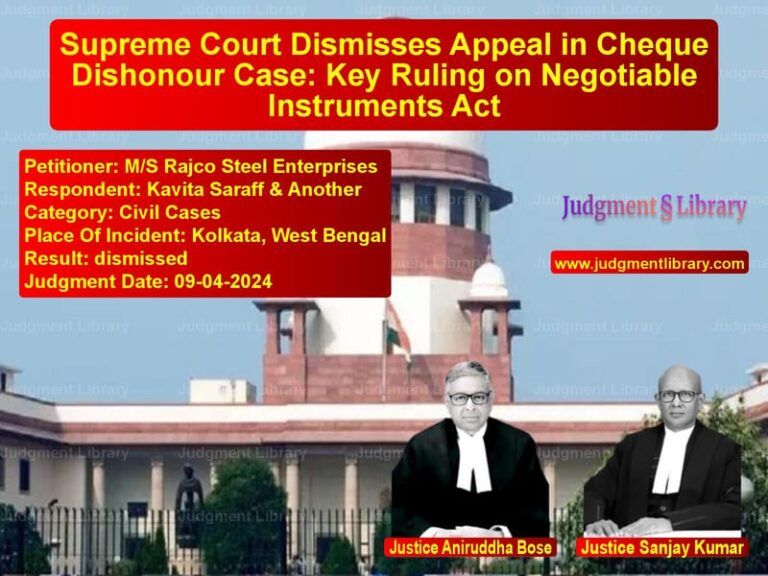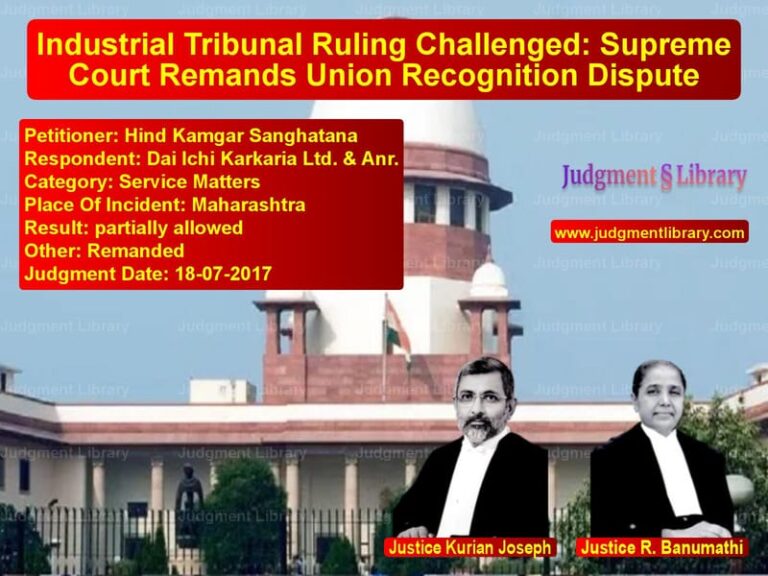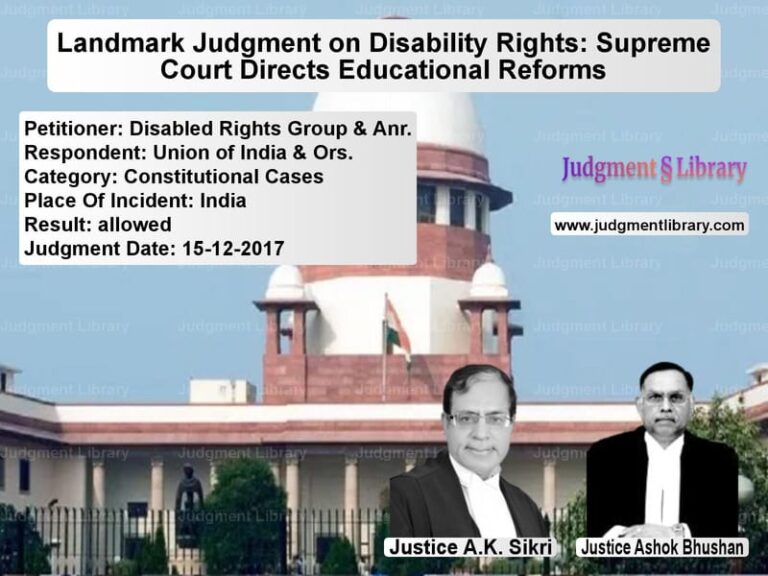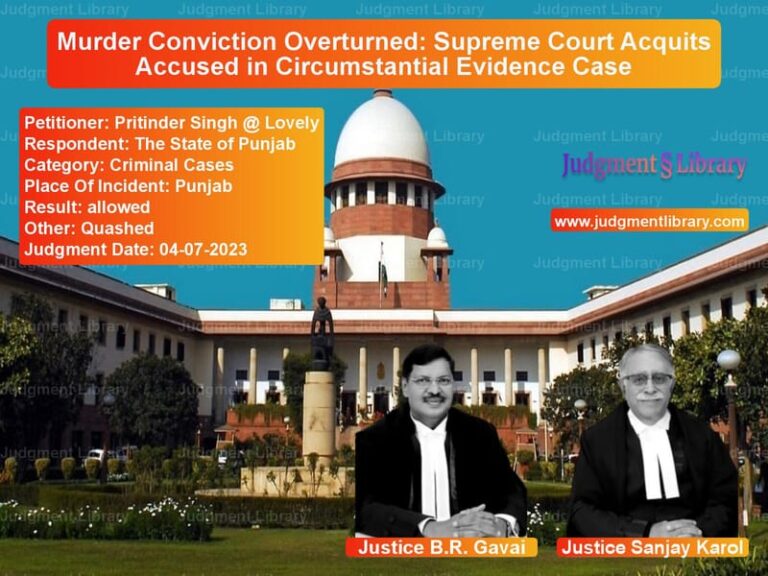Supreme Court Refers NCT of Delhi’s Service Control Dispute to Constitution Bench
The Supreme Court of India has issued a crucial ruling in the case of Government of NCT of Delhi vs. Union of India, addressing the long-standing conflict over control of services in the National Capital Territory (NCT) of Delhi. The judgment deals with the interpretation of Article 239AA of the Constitution, which defines the governance framework for Delhi.
The Court held that the matter requires further examination by a five-judge Constitution Bench to determine the scope of legislative and executive powers between the Centre and the Delhi government. The ruling marks a critical step in resolving the jurisdictional conflict between the elected government of Delhi and the Lieutenant Governor (LG), representing the Union government.
Background of the Case
The dispute originated from the interpretation of Article 239AA, which grants Delhi a legislative assembly with powers similar to a state, but with significant limitations. The Government of NCT of Delhi (GNCTD) and the Union of India have been in disagreement over who controls ‘services’—a key administrative function that includes bureaucratic appointments and transfers.
The first round of proceedings led to a Constitution Bench ruling on July 4, 2018, which laid down the framework for Delhi’s governance but did not conclusively determine control over ‘services.’ The case was then referred to a two-judge bench, which delivered a split verdict on February 14, 2019, necessitating another referral.
Key Legal Issues
- Whether the legislative and executive powers of the Delhi government include control over ‘services’ (Entry 41, List II of the Constitution).
- The meaning of the phrase ‘insofar as any such matter is applicable to Union Territories’ under Article 239AA(3)(a).
- The impact of the phrase ‘subject to the provisions of this Constitution’ in determining the extent of Delhi’s legislative powers.
- Whether the Government of NCT of Delhi (Amendment) Act, 2021, which strengthened the Lieutenant Governor’s powers, violates constitutional principles.
Arguments Presented
Petitioner’s (Government of NCT of Delhi) Arguments
- The 2018 Constitution Bench ruling already clarified that the elected government of Delhi has primacy over governance and that the Lieutenant Governor must act on its advice.
- The Centre’s control over ‘services’ effectively renders the Delhi government powerless and negates the purpose of granting it a legislative assembly.
- The phrase ‘insofar as any such matter is applicable to Union Territories’ should not be interpreted to limit Delhi’s legislative authority over services.
Respondent’s (Union of India) Arguments
- Delhi remains a Union Territory under the Constitution, and therefore, its governance structure cannot be equated with that of full-fledged states.
- The Government of NCT of Delhi (Amendment) Act, 2021, which enhances the LG’s powers, is constitutionally valid and necessary to ensure effective governance.
- The Centre has a legitimate interest in controlling services to maintain national security and administrative stability in the capital.
Supreme Court’s Observations and Ruling
1. Need for a Constitution Bench
The Supreme Court ruled that the case involves a substantial question of constitutional interpretation that warrants a reference to a five-judge bench. The judgment stated:
“The issue of control over ‘services’ is central to the functioning of the NCT of Delhi. Given its implications, an authoritative pronouncement by a Constitution Bench is necessary.”
2. High Stakes for Delhi’s Governance
The Court acknowledged the significance of the dispute in ensuring the efficient administration of Delhi:
“The ability of an elected government to function effectively depends on control over its officials. Resolving this dispute will have far-reaching consequences for federal governance.”
3. Interpretation of Article 239AA
The ruling highlighted that previous judgments had not conclusively interpreted the phrase ‘insofar as any such matter is applicable to Union Territories.’ The Court noted:
“The precise scope of Article 239AA(3)(a) remains unresolved. A Constitution Bench must determine the extent of legislative power granted to the Delhi government.”
4. Reviewing the 2021 Amendment Act
The Court also acknowledged the impact of the Government of NCT of Delhi (Amendment) Act, 2021, which enhances the LG’s role. It stated:
“The amendments have raised fresh concerns regarding the balance of power in Delhi’s governance structure. A Constitution Bench will evaluate their constitutional validity.”
Impact of the Judgment
1. Clarification of Delhi’s Status
The ruling is expected to provide a definitive interpretation of whether Delhi’s governance structure is closer to that of a full-fledged state or a Union Territory with limited powers.
2. Determining Control Over Bureaucracy
The outcome will directly impact the Delhi government’s ability to appoint and transfer officers, which is crucial for day-to-day administration.
3. Strengthening Federalism
The judgment will set an important precedent for power-sharing between the Centre and Union Territories, potentially influencing governance in other UTs.
4. Judicial Oversight on Executive Actions
The case underscores the role of judicial review in resolving disputes between different levels of government and ensuring constitutional compliance.
Conclusion
The Supreme Court’s decision in Government of NCT of Delhi vs. Union of India marks a significant step toward resolving the long-standing governance dispute in Delhi. By referring the matter to a five-judge Constitution Bench, the Court has acknowledged the complexity and constitutional importance of the issue. The ruling will shape the future of federalism and executive authority in India’s capital, determining the balance of power between the elected government of Delhi and the Union government.
Petitioner Name: Government of NCT of Delhi.Respondent Name: Union of India.Judgment By: Justice N.V. Ramana, Justice Surya Kant, Justice Hima Kohli.Place Of Incident: Delhi.Judgment Date: 06-05-2022.
Don’t miss out on the full details! Download the complete judgment in PDF format below and gain valuable insights instantly!
Download Judgment: government-of-nct-of-vs-union-of-india-supreme-court-of-india-judgment-dated-06-05-2022.pdf
Directly Download Judgment: Directly download this Judgment
See all petitions in Fundamental Rights
See all petitions in Constitution Interpretation
See all petitions in Legislative Powers
See all petitions in Separation of Powers
See all petitions in Judgment by N.V. Ramana
See all petitions in Judgment by Surya Kant
See all petitions in Judgment by Hima Kohli
See all petitions in partially allowed
See all petitions in Remanded
See all petitions in supreme court of India judgments May 2022
See all petitions in 2022 judgments
See all posts in Constitutional Cases Category
See all allowed petitions in Constitutional Cases Category
See all Dismissed petitions in Constitutional Cases Category
See all partially allowed petitions in Constitutional Cases Category

